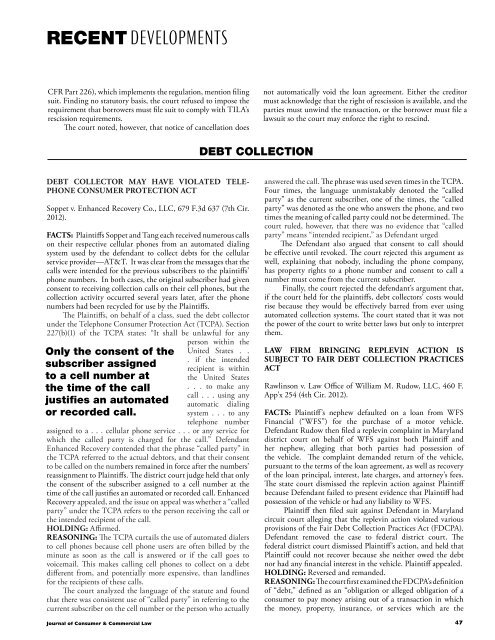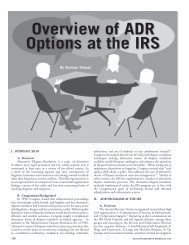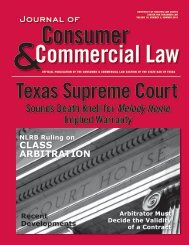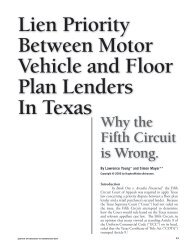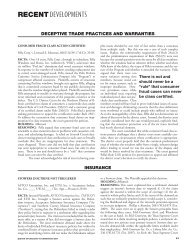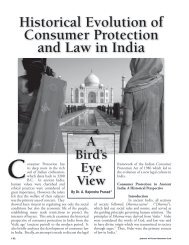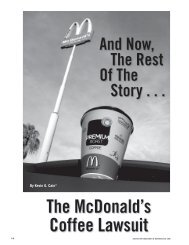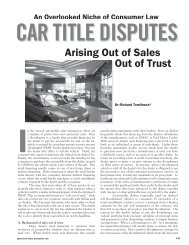Teaching Consumer Credit Law in an Evolving Australian Economy
Teaching Consumer Credit Law in an Evolving Australian Economy
Teaching Consumer Credit Law in an Evolving Australian Economy
You also want an ePaper? Increase the reach of your titles
YUMPU automatically turns print PDFs into web optimized ePapers that Google loves.
RECENT DEVELOPMENTS<br />
CFR Part 226), which implements the regulation, mention fil<strong>in</strong>g<br />
suit. F<strong>in</strong>d<strong>in</strong>g no statutory basis, the court refused to impose the<br />
requirement that borrowers must file suit to comply with TILA’s<br />
rescission requirements.<br />
The court noted, however, that notice of c<strong>an</strong>cellation does<br />
not automatically void the lo<strong>an</strong> agreement. Either the creditor<br />
must acknowledge that the right of rescission is available, <strong>an</strong>d the<br />
parties must unw<strong>in</strong>d the tr<strong>an</strong>saction, or the borrower must file a<br />
lawsuit so the court may enforce the right to resc<strong>in</strong>d.<br />
DEBT COLLECTION<br />
DEBT COLLECTOR MAY HAVE VIOLATED TELE-<br />
PHONE CONSUMER PROTECTION ACT<br />
Soppet v. Enh<strong>an</strong>ced Recovery Co., LLC, 679 F.3d 637 (7th Cir.<br />
2012).<br />
FACTS: Pla<strong>in</strong>tiffs Soppet <strong>an</strong>d T<strong>an</strong>g each received numerous calls<br />
on their respective cellular phones from <strong>an</strong> automated dial<strong>in</strong>g<br />
system used by the defend<strong>an</strong>t to collect debts for the cellular<br />
service provider—AT&T. It was clear from the messages that the<br />
calls were <strong>in</strong>tended for the previous subscribers to the pla<strong>in</strong>tiffs’<br />
phone numbers. In both cases, the orig<strong>in</strong>al subscriber had given<br />
consent to receiv<strong>in</strong>g collection calls on their cell phones, but the<br />
collection activity occurred several years later, after the phone<br />
numbers had been recycled for use by the Pla<strong>in</strong>tiffs.<br />
The Pla<strong>in</strong>tiffs, on behalf of a class, sued the debt collector<br />
under the Telephone <strong>Consumer</strong> Protection Act (TCPA). Section<br />
227(b)(1) of the TCPA states: “It shall be unlawful for <strong>an</strong>y<br />
Only the consent of the<br />
subscriber assigned<br />
to a cell number at<br />
the time of the call<br />
justifies <strong>an</strong> automated<br />
or recorded call.<br />
person with<strong>in</strong> the<br />
United States . .<br />
. if the <strong>in</strong>tended<br />
recipient is with<strong>in</strong><br />
the United States<br />
. . . to make <strong>an</strong>y<br />
call . . . us<strong>in</strong>g <strong>an</strong>y<br />
automatic dial<strong>in</strong>g<br />
system . . . to <strong>an</strong>y<br />
telephone number<br />
assigned to a . . . cellular phone service . . . or <strong>an</strong>y service for<br />
which the called party is charged for the call.” Defend<strong>an</strong>t<br />
Enh<strong>an</strong>ced Recovery contended that the phrase “called party” <strong>in</strong><br />
the TCPA referred to the actual debtors, <strong>an</strong>d that their consent<br />
to be called on the numbers rema<strong>in</strong>ed <strong>in</strong> force after the numbers’<br />
reassignment to Pla<strong>in</strong>tiffs. The district court judge held that only<br />
the consent of the subscriber assigned to a cell number at the<br />
time of the call justifies <strong>an</strong> automated or recorded call. Enh<strong>an</strong>ced<br />
Recovery appealed, <strong>an</strong>d the issue on appeal was whether a “called<br />
party” under the TCPA refers to the person receiv<strong>in</strong>g the call or<br />
the <strong>in</strong>tended recipient of the call.<br />
HOLDING: Affirmed.<br />
REASONING: The TCPA curtails the use of automated dialers<br />
to cell phones because cell phone users are often billed by the<br />
m<strong>in</strong>ute as soon as the call is <strong>an</strong>swered or if the call goes to<br />
voicemail. This makes call<strong>in</strong>g cell phones to collect on a debt<br />
different from, <strong>an</strong>d potentially more expensive, th<strong>an</strong> l<strong>an</strong>dl<strong>in</strong>es<br />
for the recipients of these calls.<br />
The court <strong>an</strong>alyzed the l<strong>an</strong>guage of the statute <strong>an</strong>d found<br />
that there was consistent use of “called party” <strong>in</strong> referr<strong>in</strong>g to the<br />
current subscriber on the cell number or the person who actually<br />
<strong>an</strong>swered the call. The phrase was used seven times <strong>in</strong> the TCPA.<br />
Four times, the l<strong>an</strong>guage unmistakably denoted the “called<br />
party” as the current subscriber, one of the times, the “called<br />
party” was denoted as the one who <strong>an</strong>swers the phone, <strong>an</strong>d two<br />
times the me<strong>an</strong><strong>in</strong>g of called party could not be determ<strong>in</strong>ed. The<br />
court ruled, however, that there was no evidence that “called<br />
party” me<strong>an</strong>s “<strong>in</strong>tended recipient,” as Defend<strong>an</strong>t urged<br />
The Defend<strong>an</strong>t also argued that consent to call should<br />
be effective until revoked. The court rejected this argument as<br />
well, expla<strong>in</strong><strong>in</strong>g that nobody, <strong>in</strong>clud<strong>in</strong>g the phone comp<strong>an</strong>y,<br />
has property rights to a phone number <strong>an</strong>d consent to call a<br />
number must come from the current subscriber.<br />
F<strong>in</strong>ally, the court rejected the defend<strong>an</strong>t’s argument that,<br />
if the court held for the pla<strong>in</strong>tiffs, debt collectors’ costs would<br />
rise because they would be effectively barred from ever us<strong>in</strong>g<br />
automated collection systems. The court stated that it was not<br />
the power of the court to write better laws but only to <strong>in</strong>terpret<br />
them.<br />
LAW FIRM BRINGING REPLEVIN ACTION IS<br />
SUBJECT TO FAIR DEBT COLLECTION PRACTICES<br />
ACT<br />
Rawl<strong>in</strong>son v. <strong>Law</strong> Office of William M. Rudow, LLC, 460 F.<br />
App’x 254 (4th Cir. 2012).<br />
FACTS: Pla<strong>in</strong>tiff’s nephew defaulted on a lo<strong>an</strong> from WFS<br />
F<strong>in</strong><strong>an</strong>cial (“WFS”) for the purchase of a motor vehicle.<br />
Defend<strong>an</strong>t Rudow then filed a replev<strong>in</strong> compla<strong>in</strong>t <strong>in</strong> Maryl<strong>an</strong>d<br />
district court on behalf of WFS aga<strong>in</strong>st both Pla<strong>in</strong>tiff <strong>an</strong>d<br />
her nephew, alleg<strong>in</strong>g that both parties had possession of<br />
the vehicle. The compla<strong>in</strong>t dem<strong>an</strong>ded return of the vehicle,<br />
pursu<strong>an</strong>t to the terms of the lo<strong>an</strong> agreement, as well as recovery<br />
of the lo<strong>an</strong> pr<strong>in</strong>cipal, <strong>in</strong>terest, late charges, <strong>an</strong>d attorney’s fees.<br />
The state court dismissed the replev<strong>in</strong> action aga<strong>in</strong>st Pla<strong>in</strong>tiff<br />
because Defend<strong>an</strong>t failed to present evidence that Pla<strong>in</strong>tiff had<br />
possession of the vehicle or had <strong>an</strong>y liability to WFS.<br />
Pla<strong>in</strong>tiff then filed suit aga<strong>in</strong>st Defend<strong>an</strong>t <strong>in</strong> Maryl<strong>an</strong>d<br />
circuit court alleg<strong>in</strong>g that the replev<strong>in</strong> action violated various<br />
provisions of the Fair Debt Collection Practices Act (FDCPA).<br />
Defend<strong>an</strong>t removed the case to federal district court. The<br />
federal district court dismissed Pla<strong>in</strong>tiff’s action, <strong>an</strong>d held that<br />
Pla<strong>in</strong>tiff could not recover because she neither owed the debt<br />
nor had <strong>an</strong>y f<strong>in</strong><strong>an</strong>cial <strong>in</strong>terest <strong>in</strong> the vehicle. Pla<strong>in</strong>tiff appealed.<br />
HOLDING: Reversed <strong>an</strong>d rem<strong>an</strong>ded.<br />
REASONING: The court first exam<strong>in</strong>ed the FDCPA’s def<strong>in</strong>ition<br />
of “debt,” def<strong>in</strong>ed as <strong>an</strong> “obligation or alleged obligation of a<br />
consumer to pay money aris<strong>in</strong>g out of a tr<strong>an</strong>saction <strong>in</strong> which<br />
the money, property, <strong>in</strong>sur<strong>an</strong>ce, or services which are the<br />
Journal of <strong>Consumer</strong> & Commercial <strong>Law</strong> 47


